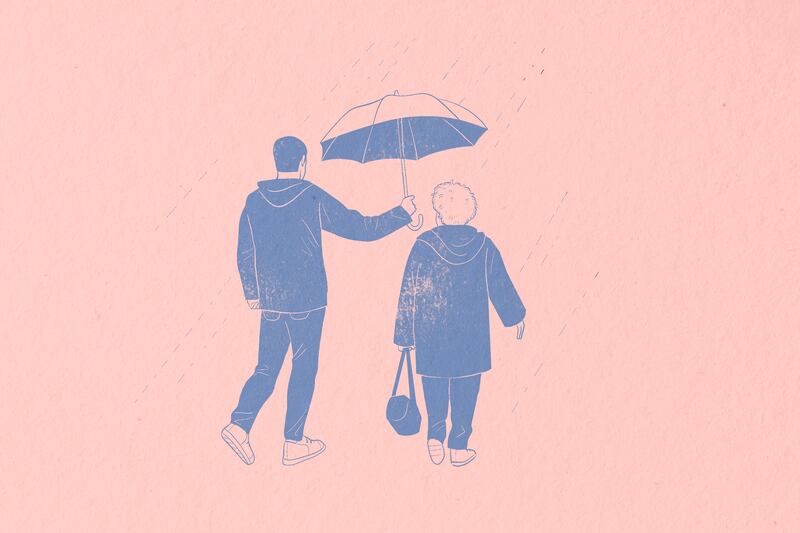There’s a deep poverty in age-segregated societies. It is especially pronounced in high school and college, when teens and twenty-somethings are often siloed off from older people, even those in their own families.
Over a third of millennials say they have no close friends from a different generation. Barna’s poll found that other generations had more cross-generational ties, but all Americans were much less likely to find these friendships if they didn’t attend church. It’s hard to find a substitute for the universal call of a faith community, and harder to find people unlike yourself when you meet through mutual friends or through interest groups.
Perhaps that’s why, in a recent New York Times feature on millennials approaching middle age, many of the people interviewed were reluctant to describe themselves as middle-aged, or even as adults. One 39-year-old woman said she preferred to think of herself as a “late young adult.” It’s difficult to imagine holding onto that description while on the cusp of 40 unless you don’t know someone older than yourself who you genuinely admire.
One of the most delightful ways to shatter age silos is locating nursery schools and nursing homes together. Both seniors and toddlers move unsteadily through a world built for the capacities of able-bodied adults. Both ages are more willing to sit in contemplation while the “productive” world hurries by. But there’s also a more bittersweet appeal to their friendships. As Francesca Cavozzi, the leader of a shared nursing home/nursery school in Italy, explained to The New York Times, “The old person feels that the adult looks at them with pity. The child doesn’t do this yet.”
There’s another natural, but under-appreciated affinity between ages. More elder care should be taken on by teenaged boys. Aging seniors often need physical support, which may go beyond what their adult children and caretakers can provide. Teen boys need to be needed, and they need examples of how they can grow into someone that others can depend on.
For teen boys, adolescence is a time of growing into strength without necessarily knowing what to do with it. Team sports are a way to blow off energy and grow into brotherhood; shop class can be a way to learn to make a mark on the world. But it’s hard for young men to get experience with the other purpose of their strength — to be a support to someone weaker than themselves.
Teen boys are less likely than girls to sign up as babysitters, and even less likely to be hired. When a young man takes an interest in children, he’s more often met with suspicion than with praise for his desire to develop the virtues he’ll need as a father. Boys in big families get to care for younger siblings (my husband had changed more diapers than I had before our first child was born), but those in smaller families or at the end of the birth order have less experience.
At the same time, the ever growing sandwich generation of adults who are caring for both their children and their elderly parents is strained beyond capacity. It’s not just the time crunch — elderly parents may require more physical strength than their children have. A senior might need to be lifted to get in or out of a wheelchair, to reach the toilet, to get dressed. In Japan, one proposed solution is donning an exoskeleton that can help a petite woman lift more than her own muscles and bones could safely support. But it’s good to have more people to depend on, not just more ways to extend what you can ask of your own body.
For Margaret Swinger, a member of the Bruderhof, an Anabaptist Christian community, it was a profound gift when her brother Duane was cared for by the young men of her community. Duane had a severe form of epilepsy, and he spent his day in a special needs school. But, one day, her pastor recommended, “what if Duane came home from his school for special needs — to teach?”
As Swinger described in her essay “The Teacher Who Never Spoke,” Duane was cared for by rotating teams of two young men, who stayed with the family. The boys came because their strength was needed. By the time they finished their stay, they had learned how to temper their strength with gentleness, how to choose where to apply it through patient attentiveness. When they grew into men, they thanked the Swinger family for giving them the chance to learn how to be good husbands and fathers by caring for Duane.
Caring for the weak is good formation for young males who hope to grow up to be depended on as men. It gives them a chance to take pride in their distinctive, masculine gifts, while also seeing that they receive these gifts in order to offer them to others.
Too many teen boys and young men get stuck in a holding pattern — too young for marriage and unsure what to do with their liveliness in the meantime. They don’t need more allowances made for them; they need more to be asked of them. Boys will be boys until someone depends on them to be men.
Leah Libresco Sargeant is the author of “Arriving at Amen” and “Building the Benedict Option.” She runs the substack Other Feminisms, focused on the dignity of interdependence.


